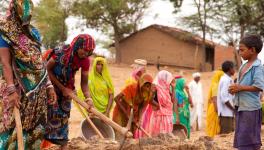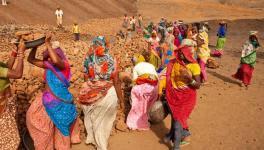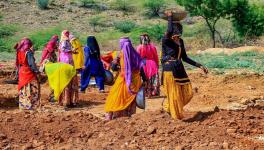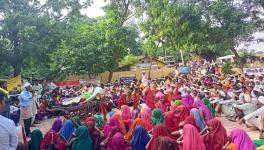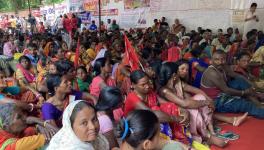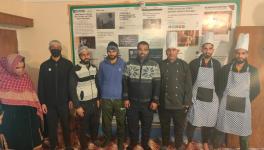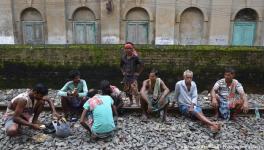Mandatory App Attendance Leaves Disabled MGNREGA Workers in Lurch
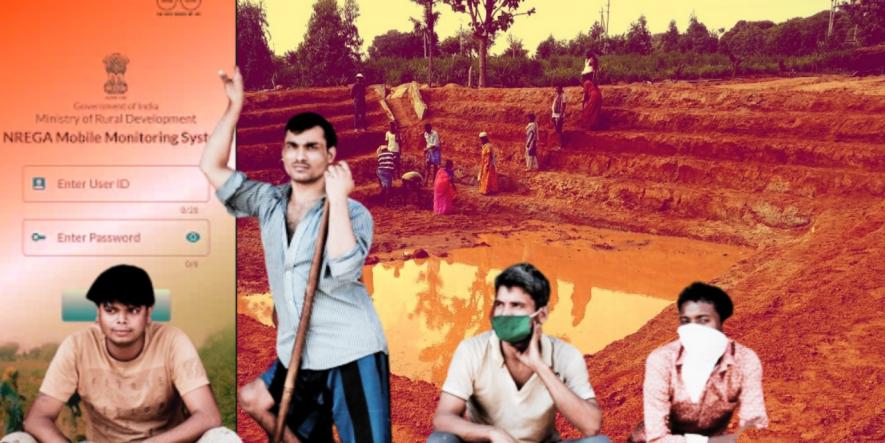
The livelihood of millions of vulnerable rural workers, especially the disabled, has been jeopardised with the Centre making it mandatory to record attendance in an app to monitor work under MGNREGA.
Due to poor connectivity and electric supply and the lack of digital literacy, many workers have been unable to register attendance for working days. Special provisions made for the disabled under MGNREGA are not accounted for in this app.
Kaaluram and his wife, from Uttar Pradesh’s Ayodhya, are both disabled and have been MGNREGA workers since its inception.
Kaaluram still awaits the wages for the 43 workdays this year. Delayed wage payment is not new but the problem is worse this year with his supervisor informing him that his attendance was not recorded. Neither his supervisor (also known as mate) nor the Panchayat knows whether workers whose attendance wasn’t recorded in the app will ever get paid, Kaaluram said.
“I didn’t have money to buy paracetamol for my sick wife, who hadn’t even eaten for two days? I informed the Panchayat and the mate that I needed my wages; otherwise, my wife would die. But they were helpless,” he said.
Luckily, one of the Panchayat members helped Kaaluram get work at a construction site under a local contractor. “I was able to buy ration and paracetamol for my wife,” he said.
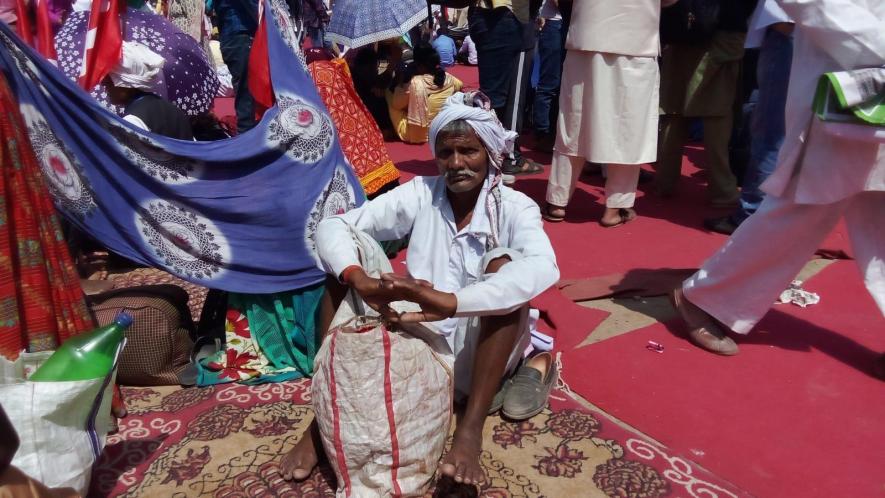
MGNREGA worker Kaaluram at the Mazdoor Kisan Sangharsh Rally at Ramlila Maidan, New Delhi, on April 5.
The rural development ministry launched the National Mobile Monitoring System (NMMS) app on March 21, 2021, to “effectively implement” MGNREGA. On January 1, the Centre made it mandatory to upload geo-tagged photos of workers twice daily—once before 11 am and after 2 pm—to track their attendance.
Mamta (38), a polio-affected widow with three children from West Bengal’s Cooch Behar, mentioned the challenges posed by the app.
“I start work at 9 am and am required to stay till 5 pm since my photo must be uploaded twice a day for wage payment,” she said adding that “working under MGNREGA with delayed wages and longer working hours is becoming increasingly unviable”.
A worker must work for at least seven hours and a maximum of 12 under MGNREGA guidelines. Working hours for the disabled are relaxed by 25% (four to five-and-a-half hours). Working hours for the disabled vary by state—for instance, in Tamil Nadu, they work only for four hours a day.
However, some states don’t follow the guidelines for disabled workers. In Haryana, “workers with disabilities have been threatened several times with wage deduction for taking even a five-minute break during summer,” said Rishikesh Rajli, all-India joint secretary of National Platform for the Rights of the Disabled (NPRD) and general secretary of Haryana Vikalang Adhikar Manch.
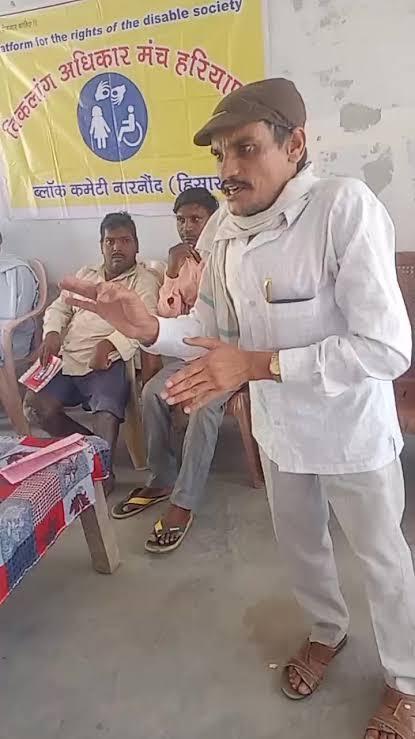
Rishikesh Rajli, all-India joint secretary of NPRD and general secretary of Haryana Vikalang Adhikar Manch.
Now, even states which relaxed working hours for the disabled are not following the guidelines since NMMS attendance was made mandatory.
Mamta worked for 16 days in the first quarter of this year but her attendance was marked for only one day. On approaching the Panchayat, she was told to complain to the block officer but to no avail.
In several instances, disabled workers couldn’t record their attendance due to server and technical issues with the NMMS.
On paper, the ministry has authorised the district programme coordinator to “upload manual attendance” when there are “exceptional circumstances” due to which attendance on the app can’t be uploaded.
However, workers often cannot contact district officials to get their attendance uploaded manually. The risk of such attendance discrepancies going unreported has increased further because physical muster rolls are no longer required to be maintained on sites.
When the app was introduced, many workers were misled into believing that they needed to upload attendance using their smartphones.
However, Kaaluram, who “sold his goat to buy a phone”, later learned that the mate uploads attendance. “What should I do with the phone now?” he asked.
Surendra Venu (32), a disabled site supervisor from Telangana’s Khammam, “borrowed money” to buy a smartphone. “There was no financial support to purchase the phone or recharge data.”
Venu never received training to tackle the “frequent technical glitches in the NMMS. Senior officials instruct us to uninstall and reinstall the app when it does not work, which is time-consuming. Attendance is not uploaded on time while the workload increases,” he said.
A mate’s phone and sim card used to sign up for the NMMS for the first time is linked to the app. A mate cannot log in using their ID from another phone. If the phone isn’t functional, they can’t register that day. Similarly, the app cannot be used if the mate changes his/her phone number or sim.
Workers, especially the disabled, can’t comprehend the troubleshooting instructions displayed when the app malfunctions.
DIGITAL DIVIDE DISADVANTAGES
The ministry has consistently called for hiring women workers and the disabled with some states making it mandatory. But most disabled women aren’t hired because they can’t afford smartphones.
The app has also made it difficult for underprivileged workers to get hired as mates. Literate people who can afford a smartphone with an Internet connection have mostly taken up these jobs.
“Our mate always complains that the app has crashed and not working for the whole day due to the lack of electricity and poor Internet connectivity in our area,” complained Parvati Devi, a 53-year-old disabled worker from Bihar’s Samastipur.
“We went back home worried that we wouldn’t get a single penny. Why work if our attendance is not recorded?” she said.
When workers log in around 9 am, the app frequently hangs. Internet shutdowns in various states in the name of law and order add to the problem. State governments do not recognise or cover MGNREGA workers for the lost work and wages in such cases.
The government has justified mandatory attendance uploading on the grounds that it will reduce corruption and increase transparency. However, the app can’t validate whether the worker listed on the site is the same as in the photo. Furthermore, the app can’t determine whether the photo is of a worker or someone else.
Paragraph 15 of Schedule I of the Act mandates that “(b) Muster Rolls shall be maintained at the worksite by marking attendance daily by a person authorised under the Scheme” and “(g) Any person shall have access to muster rolls on the worksite on demand all days during all working hours”.
Therefore, making attendance uploading on the NMMS contravenes the Act and violates the worker’s right to access and verify attendance records at the worksite and seek redressal from the DCP. Disabled workers, especially those with visual and hearing impairment, autism, cerebral palsy, mental retardation and multiple disabilities, are particularly vulnerable.
According to MGNREGA guidelines, the disabled and vulnerable are the highest priority and state governments must identify specific tasks they can perform. Different types of disabled individuals must be identified and organised in a village to work as a defined group to complete the suggested tasks. But less than 2 million of the 26.8 million disabled people (less than 7.5%) counted in the 2011 Census have been employed under the scheme since its inception.
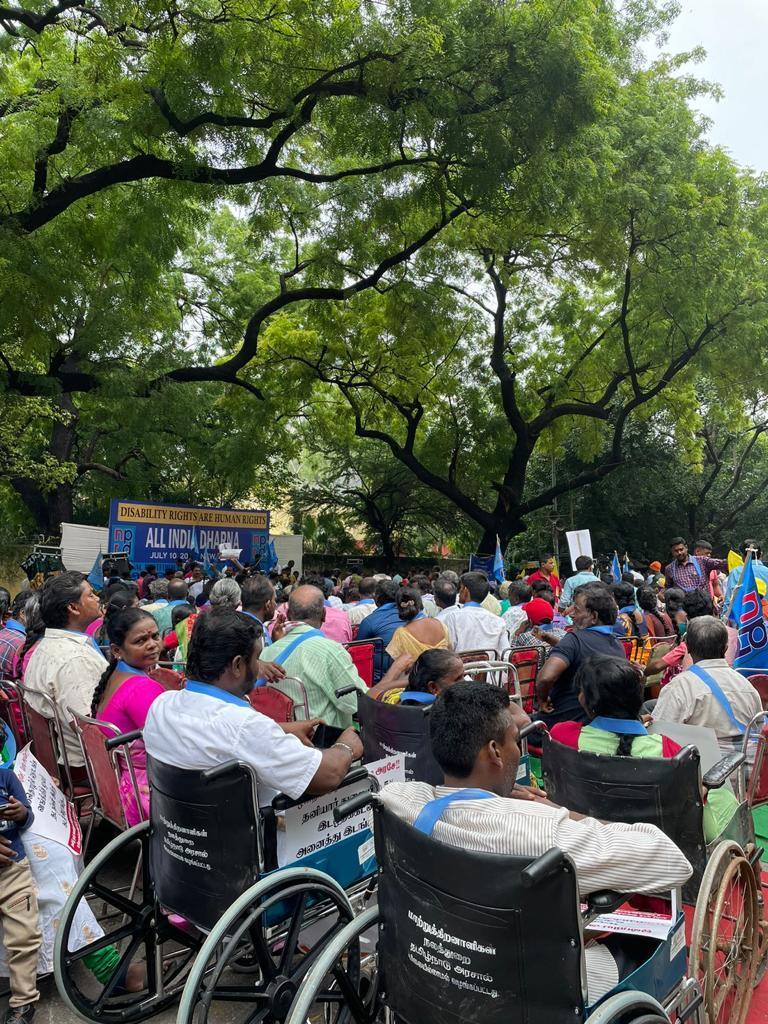
According to MGNREGA guidelines, the disabled and vulnerable must be given the highest priority in hiring.
During the 2020-21 COVID-19 lockdown, only 6 lakh of the more than 22 lakh disabled people who applied under MGNREGA were hired. In 2022-23, only around 5 lakh of the more than 23 lakh disabled applicants were hired—18,79,836 of the 23,70,182 job applications by disabled persons (around 79%) were rejected.
With 45.6% illiteracy, the disabled already faced difficulties in applying for MGNREGA. The app has further undermined the right to livelihood of vulnerable workers, including 18 million disabled villagers.
The writer is a research associate with the National Platform for the Rights of the Disabled. The views are personal.
Get the latest reports & analysis with people's perspective on Protests, movements & deep analytical videos, discussions of the current affairs in your Telegram app. Subscribe to NewsClick's Telegram channel & get Real-Time updates on stories, as they get published on our website.











